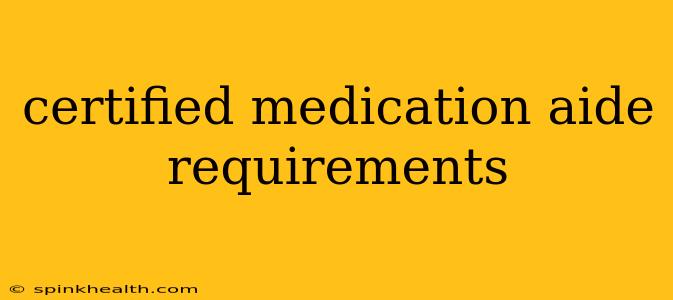The path to becoming a Certified Medication Aide (CMA) is a rewarding journey, opening doors to a fulfilling career in healthcare. But what exactly does it take? Let's delve into the requirements, exploring the educational pathways, certifications, and responsibilities involved. This isn't just a job; it's a chance to make a real difference in people's lives, one medication administration at a time.
What are the Educational Requirements to Become a Certified Medication Aide?
The educational requirements to become a CMA vary slightly from state to state, but generally involve a combination of classroom learning and hands-on training. Think of it as a blend of theory and practice, ensuring you're equipped for the real-world challenges of medication management. Many states require completion of a state-approved training program, often offered through vocational schools, community colleges, or even directly by healthcare facilities. These programs typically cover topics such as:
- Pharmacology: Understanding medications, their uses, and potential side effects. This is crucial for safe and effective medication administration.
- Medication Calculations: Accurate dosage calculations are paramount to prevent errors. This involves mastering various formulas and techniques.
- Medication Administration Techniques: Learning the correct methods for administering medications, including oral, topical, and injectable routes.
- Legal and Ethical Considerations: Understanding the legal and ethical ramifications of medication administration, including patient rights and confidentiality.
- Documentation: Meticulous record-keeping is essential. You'll learn how to accurately document medication administration and any observed reactions.
- Patient Safety: Prioritizing patient safety is the cornerstone of this profession. The training will focus on techniques to minimize risks and handle emergencies.
What is the Certification Process for Certified Medication Aides?
Once you've completed your training, you'll need to pass a certification exam. The specific requirements and the exam itself differ by state. It's essential to check your state's Board of Nursing or equivalent regulatory body for the precise details. Generally, the exam tests your knowledge of:
- Medication knowledge: Demonstrating a thorough understanding of various medications and their properties.
- Administration techniques: Proving competency in safe and accurate medication administration.
- Legal and ethical considerations: Showing awareness of relevant laws and ethical guidelines.
- Safety procedures: Highlighting your commitment to patient safety and error prevention.
What are the Continuing Education Requirements for CMAs?
Many states mandate continuing education (CE) credits for CMAs to maintain their certification. This is to ensure that CMAs remain up-to-date with the latest advancements in medication management, pharmacology, and patient care. The specific requirements for CE credits, such as the number of credits and topics, also vary by state. Always consult your state's licensing board for the most current information.
How Long Does it Take to Become a Certified Medication Aide?
The timeframe for becoming a CMA depends largely on the length of your chosen training program. Most programs range from several weeks to a few months of intensive study. Adding in the time needed for the certification exam and any waiting periods, the entire process might take anywhere from a couple of months to six months or more.
What are the Job Responsibilities of a Certified Medication Aide?
The day-to-day responsibilities of a CMA center around accurately and safely administering medications to patients under the supervision of a licensed healthcare professional, such as a nurse or physician. This involves:
- Preparing medications: Accurately dispensing and preparing medications according to physician orders.
- Administering medications: Giving medications orally, topically, or via other approved routes.
- Monitoring patients: Observing patients for any adverse reactions to medications.
- Documenting medication administration: Keeping detailed and accurate records of all medication administrations.
- Reporting to supervising nurse: Communicating any concerns or observations about patient medication response to the supervising nurse.
This is a career that demands precision, attention to detail, and a genuine commitment to patient care. The rewards, however, are immense – the satisfaction of making a tangible difference in the lives of others. So, are you ready to embark on this rewarding journey? Start by researching the CMA requirements in your state – your future as a dedicated healthcare professional awaits.

